Mental Health Services for the Elderly Suffering with Dementia
38 Pages11806 Words134 Views
Added on 2020-12-09
About This Document
Contents ABSTRACT 2 CHAPTER I: INTRODUCTION4 Background 4 Research Questions 5 The research questions are5 Aims and Objectives 5 Significance of Research 5 Outline of chapters 6 CHAPTER II: LITERATURE REVIEW 8 Mental health problems with elderly people8 Issues with Existing Services for Dementia10 Mental Health Services 11 Knowledge gaps of care givers 12 CHAPTER III: METHODOLOGY 15 Research Design 15 Research Method 16 CHAPTER IV: ANALYSIS AND DISCUSSION 19 Results 25
Mental Health Services for the Elderly Suffering with Dementia
Added on 2020-12-09
ShareRelated Documents
Mental health services for the elderly suffering with dementia

ABSTRACTDementia is said to be a prominent disorder of elderly people. At the age of 75,prevalence rate is said to be approximately 10 % (Wall & Duffy 2010, p.113). The prevalencedoubles every five years of increasing age along with an increase in the total population with40% over the age of 85 years which will likely get affected. Evidence shows that risk ofdeveloping dementia begins beyond the age of 90 years (Mordoch et al. 2013, p.20). Dementiaappears to be a major disease or problem in the United Kingdom. It is referred to terrible stigmaof elderly people who are suffering from dementia. According to statistics presented byDepartment of Health UK, approximately 750,000 people living in the UK are suffering fromdementia disease while it is expected that these numbers will be doubled in next 30 years oftenure and create a big problem for people in future (Sampson et al. 2010, p.174). There is a needto provide best and appropriate mental health services to elderly people who have been sufferingfrom dementia disease. This research will guide mental health services provided to elderlypeople suffering from dementia and issues faced by caregivers and patients related tointerventions and mental health services.
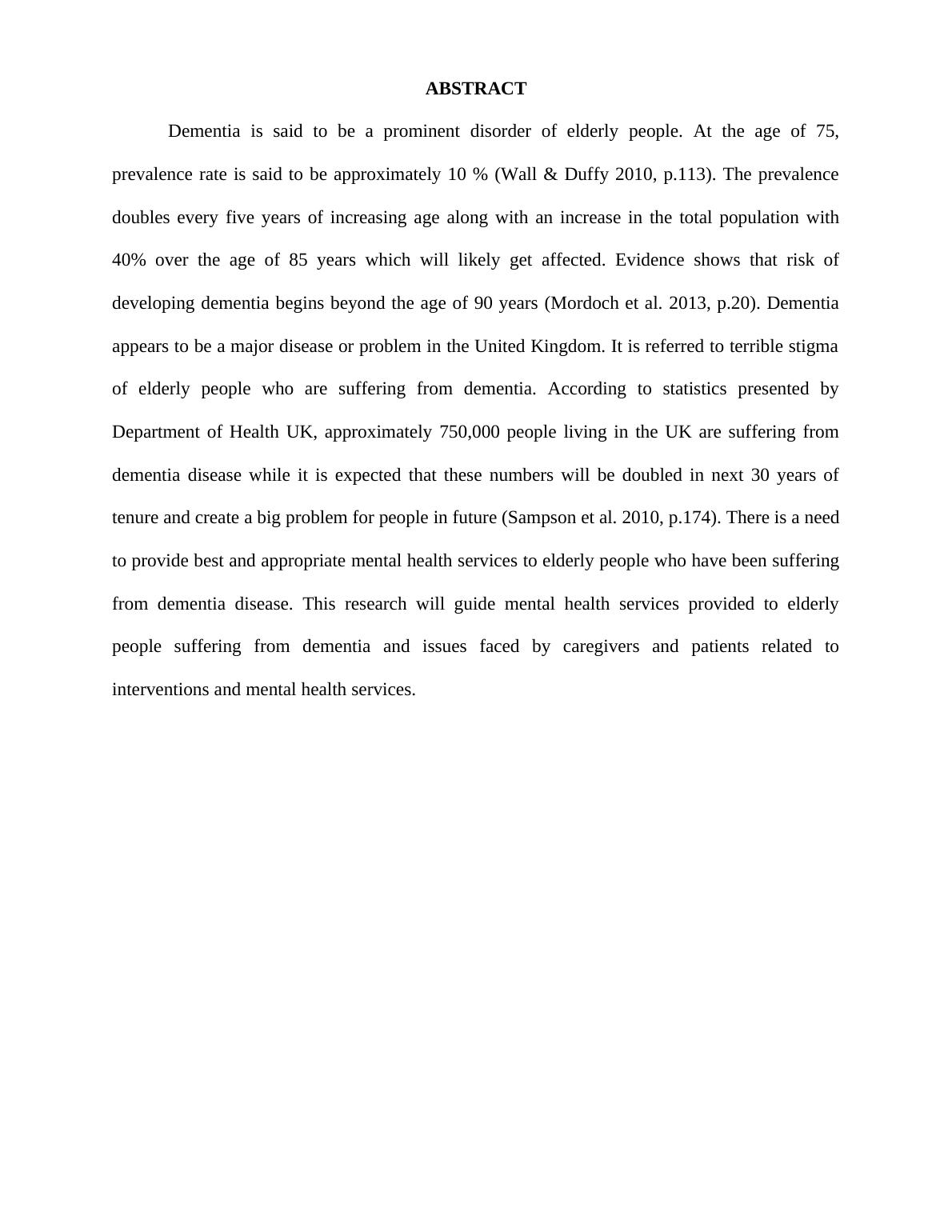
ContentsABSTRACT....................................................................................................................................................2CHAPTER I: INTRODUCTION.........................................................................................................................4Background..............................................................................................................................................4Research Questions.................................................................................................................................5The research questions are......................................................................................................................5Aims and Objectives................................................................................................................................5Significance of Research..........................................................................................................................5Outline of chapters..................................................................................................................................6CHAPTER II: LITERATURE REVIEW................................................................................................................8Mental health problems with elderly people..........................................................................................8Issues with Existing Services for Dementia............................................................................................10Mental Health Services .........................................................................................................................11Knowledge gaps of care givers...............................................................................................................12CHAPTER III: METHODOLOGY....................................................................................................................15Research Design....................................................................................................................................15Research Method..................................................................................................................................16CHAPTER IV: ANALYSIS AND DISCUSSION..................................................................................................19Results...................................................................................................................................................25CHAPTER V: CONCLUSION.........................................................................................................................27References.................................................................................................................................................31Appendix....................................................................................................................................................35Systematic Reviews...............................................................................................................................35PRISMA chart.........................................................................................................................................37

CHAPTER I: INTRODUCTIONBackgroundThe causes of dementia are progressive neuro-degeneration that is leading to memory impairment, language comprehension and speech, executive function and ability in activities of day to day living. There have been cognitive impairments, that most of the patients develop changes in personality and "behavioural and psychological symptoms of dementia (BPSD)" like psychotic symptoms (delusions and hallucinations), agitation and wandering as well as purposeless activity or the aggression in the older people. Dementia is caused by the range of underlying processes of neuropathology which is the commonest form of being the disease of In recent decades, approximately 600,000 people in the UK are affected with dementia which is 10% of people that are above the 65 years old but it has been estimated that by end of 2026 , range will be approached to 840,000 while rising to more than 1.2 million by end of 2050 (Dong 2010, p.15). All over the world, prevalence figures are all set to increase steeply, which is currently estimated at 24.3 million of people all over world suffering from dementia but this number might be affected, and it will be doubled after every 20 years to approximately 81.1 million in the year 2040. However, it has been seen that there are number of people who died dueto dementia is increasing day by day (Esbensen 2010, p.107). According to estimation from the project of UK MRC-CFAS, huge multi-centre study is looking towards functionality of health and social care of approximately 13000 older people. Moreover, it suggests that people who diedbetween the ages 65-69-year-old have a high risk of suffering from dementia while rising to approximately 58% risk of the people who died with dementia in those above the age of 9 years. In the United Kingdom, one in the three people is above the age of 65 that will die while they aresuffering from dementia (Friedman, Tanouye & Joseph 2011, p.417). According to current English National Dementia Strategy, it has been highly focused on the detection as well as
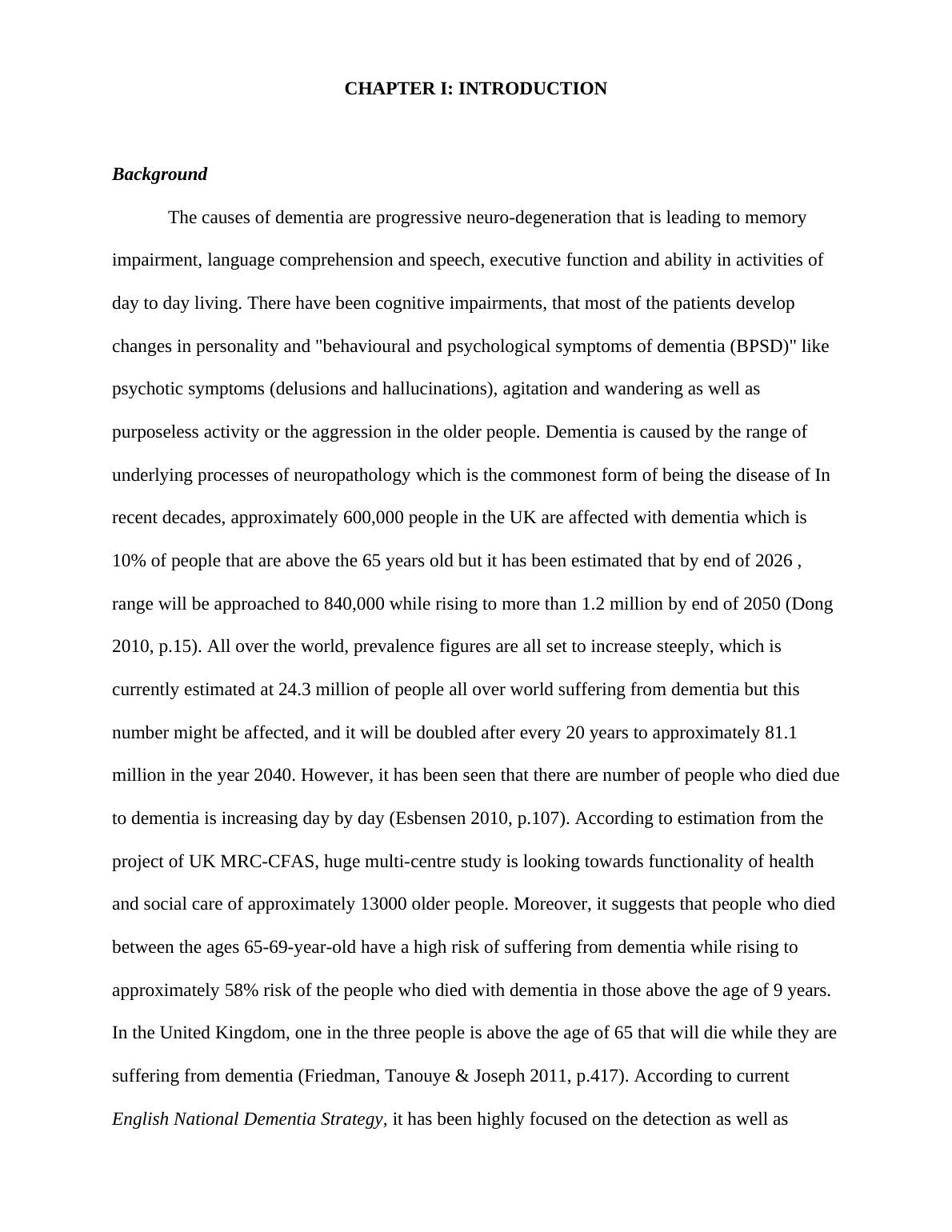
treatment of dementia at early ages with the cholinesterase inhibitors or social and psychological interventions. Hence, there has been no evidence that such type of interventions will prolong the life in the people suffering from dementia and as per recent interest in how the palliative care approach will provide benefits to the people with advanced dementia (French 2014, p.618).Research QuestionsThe research questions areWhat are current practices of mental health services for dementia patient?What are the problems faced by elderly patients in accessing mental health services in UK?Aims and ObjectivesThe study aims to critically analyse main issues that have been faced by elderly people with dementia services. Moreover, the aim is to identify gaps in current mental health services in the UK for dementia treatment of elderly people. The study will provide existing mental health services provided to dementia patient.The main objectives of the study areTo explore current practice of mental health services for dementia patient in older adultsTo identify existing mental health services provided related to dementia in the UKTo identify issues related to healthcare and support by the caregivers to elderly people.Significance of ResearchThe significance of research is that it will help to overcome issues faced by elderly people for using mental health services or treatment. There have been certain on-going current treatment that have been used to provide support to older adults suffering with dementia. This research helps to evaluate the effectiveness of services such as family care, robot therapy,
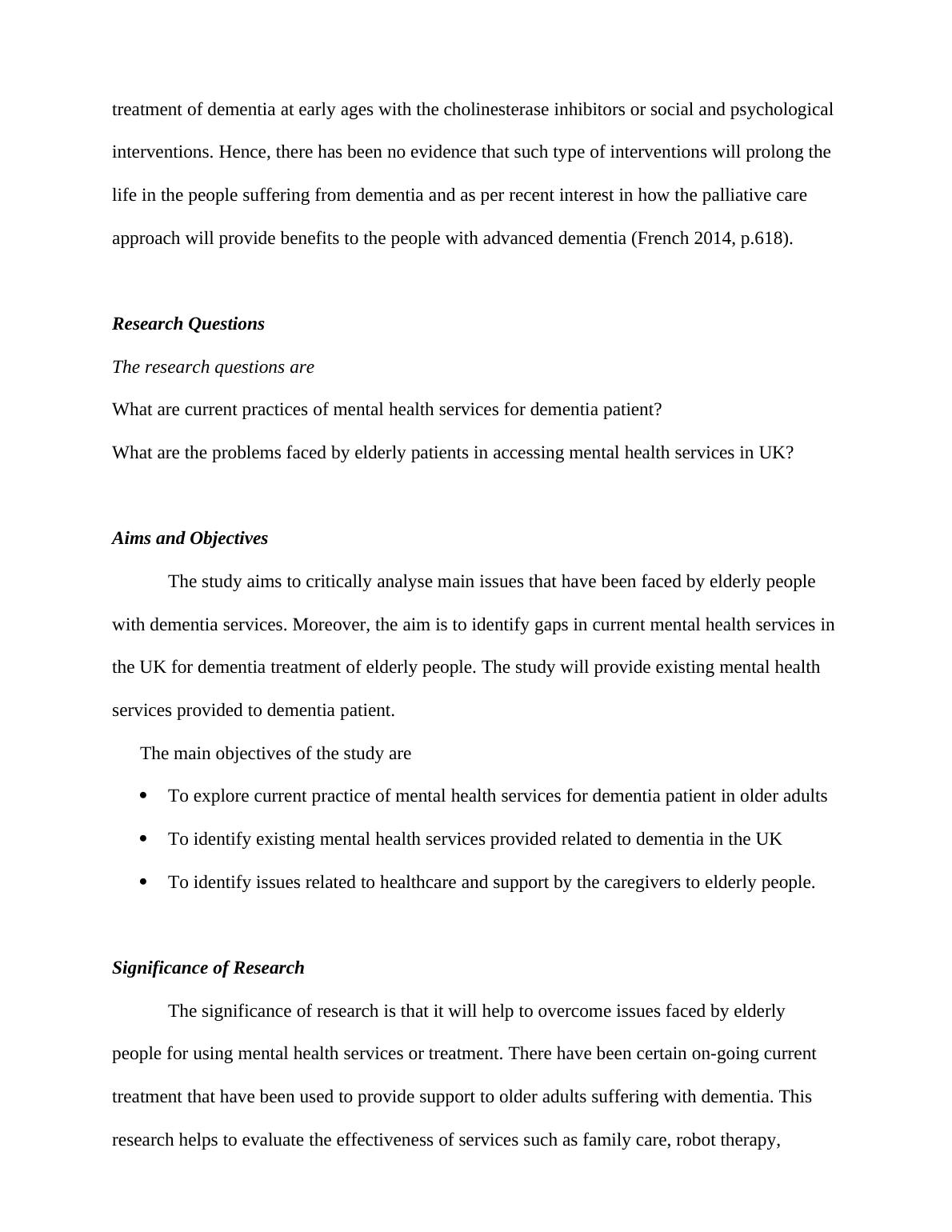
cognitive and psychology therapy that can be used for palliative care for dementia treatment. Theresearch will increase knowledge of care givers in treatment of dementia for elderly people.Outline of chaptersThe dissertation is divided into five chapters that are based on intrinsic requirements for achieving the research objective. The content covered in these chapters are explained below:CHAPTER 1: INTRODUCTIONThe first chapter will be linked with the introduction which defines the overall structure and aims and objectives of the research. This will include significance of research, developing research questions and background of research. This will help users to understand the importanceof research that will be undertaken and it will highlight relevant issues within research. Moreover, the first chapter will include determining appropriate direction within research that need to be done.CHAPTER 2: LITERATURE REVIEWThe second chapter will provide the extensive review of the past literature and appropriate and best fit research studies that have been conducted previously related to subject which is under consideration. This will help to develop comprehension of relevant theoretical and conceptual framework within the research study so that proper information can be provided to readers that aid in improving their knowledge. CHAPTER 3: RESERACH METHODOLOGYThe third chapter will go through research methodology that will be undertaken with result and findings in the next chapter. The research methodology proposed for completion of this study by performing systematic review established through PRISMA model. This will enable assessment of relevant literature intrinsically associated with overall aim and objectives ofthe study. Moreover, the systematic review will also enable assessment of various qualitative as
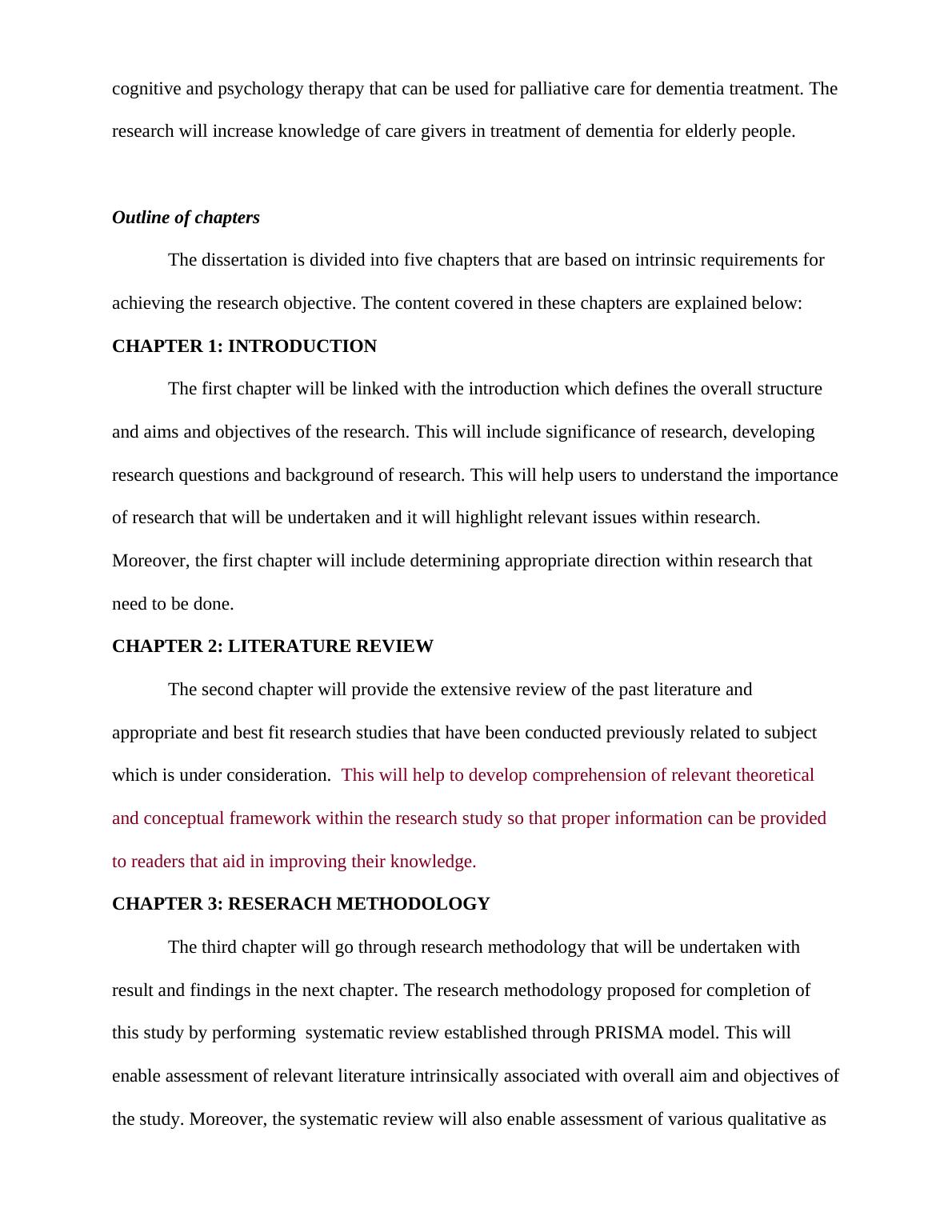
well as quantitative studies related to the subject. Hence augmenting findings of study through evaluation of empirical as well as qualitative data related to the notion has been performed under research. Hence, the selection of appropriate literature is mandatory for development of effectiveand extensive research findings and attainment of the overall research objectives. The third chapter will also include relevant ethical considerations of study as well. The ethical considerations related to study will be associated with moral and legal regulations along with the proper utilisation of secondary research studies. In addition to limitations of the study will also be enumerated in order to assert negative consequence that can be experienced throughout the study. CHAPTER 4: FINDINGS AND ANALYSISThe fourth chapter will be related to enumeration of findings and results of the study. In this section all the information collected throughout the investigation of secondary sources will be evaluated and analysed in order to extract the proper finding that can address or help researcher to accomplish its investigation objectives. CHAPTER 5: CONCLUSIONFinal fifth chapter will assert conclusive remarks related to findings of dementia patient services that has been developed in the previous chapter and assert relevant recommendations in relation to the findings. In addition to this it also includes limitation that has been found by the researcher throughout the investigation along with the quality of study that has been reviewed bythe investigator.
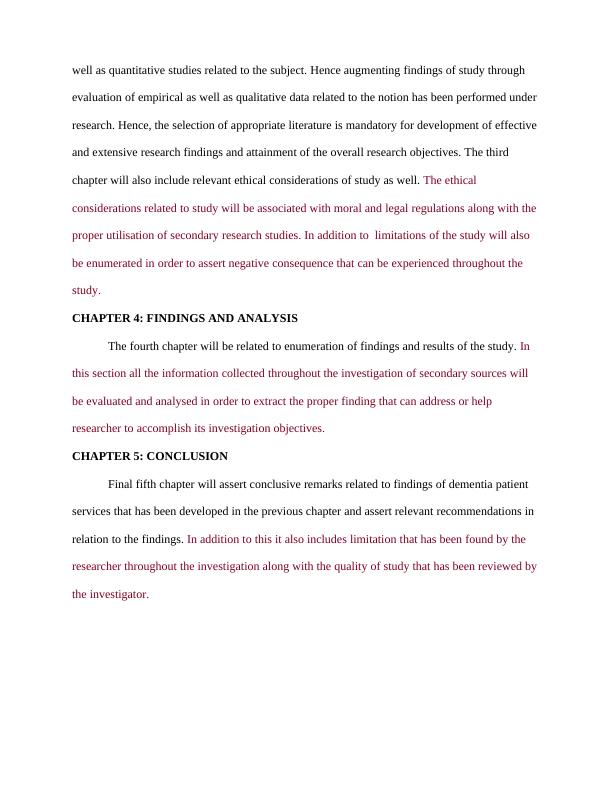
CHAPTER II: LITERATURE REVIEWMental health problems with elderly peopleDementia is said to be an umbrella which usually defines the syndromes and organic disorder where the changes to the physical structure of the brand is the main causes of illness which includes the death of brain cells or damages in the brain parts that will deal with thought processes. This will lead to the decline in the mental ability which might affects the memory, problem-solving, thinking, perception and concentration (Friedman, Tanouye & Joseph, 2011, p.422). According to Wall and Duffy (2010), older people suffering from dementia started to forget about their daily activities as well as personal hygiene, and they face difficulty in coping with the problems associated with their daily life (p.108). Mental health problems are said to be common in older people as compared to younger adults, and they are associated with suicide, individual suffering, use of health and social care services as well as poorer outcomes or results from physical illness. Though symptoms of mental health in elderly people are more or less to bevolunteered, identified or they have been treated. Specifically, very few studies such as Prince et al. (2013) have been presented that shows about complaints regarding dementia issues by elderlypeople as it is said to be a common issue of memory loss due to age factor (p.63). The presentation of mental illness is related to physical illness as compared to emotional symptoms. According to Sampson et.al (2010) dementia decreases mental ability of a person, causes mental disorder, functional or cognitive impairment, intellectual deficit that represent actual diseases that occur within older aged patients for which most of doctors, family as well as entire society must have the knowledge, compassion and they can take care of patient effectively (p.159).Many people used to lead a long and prosper life without any issues related to mental health and despite of all the relevant image of elderly people for being slow and forgetful,
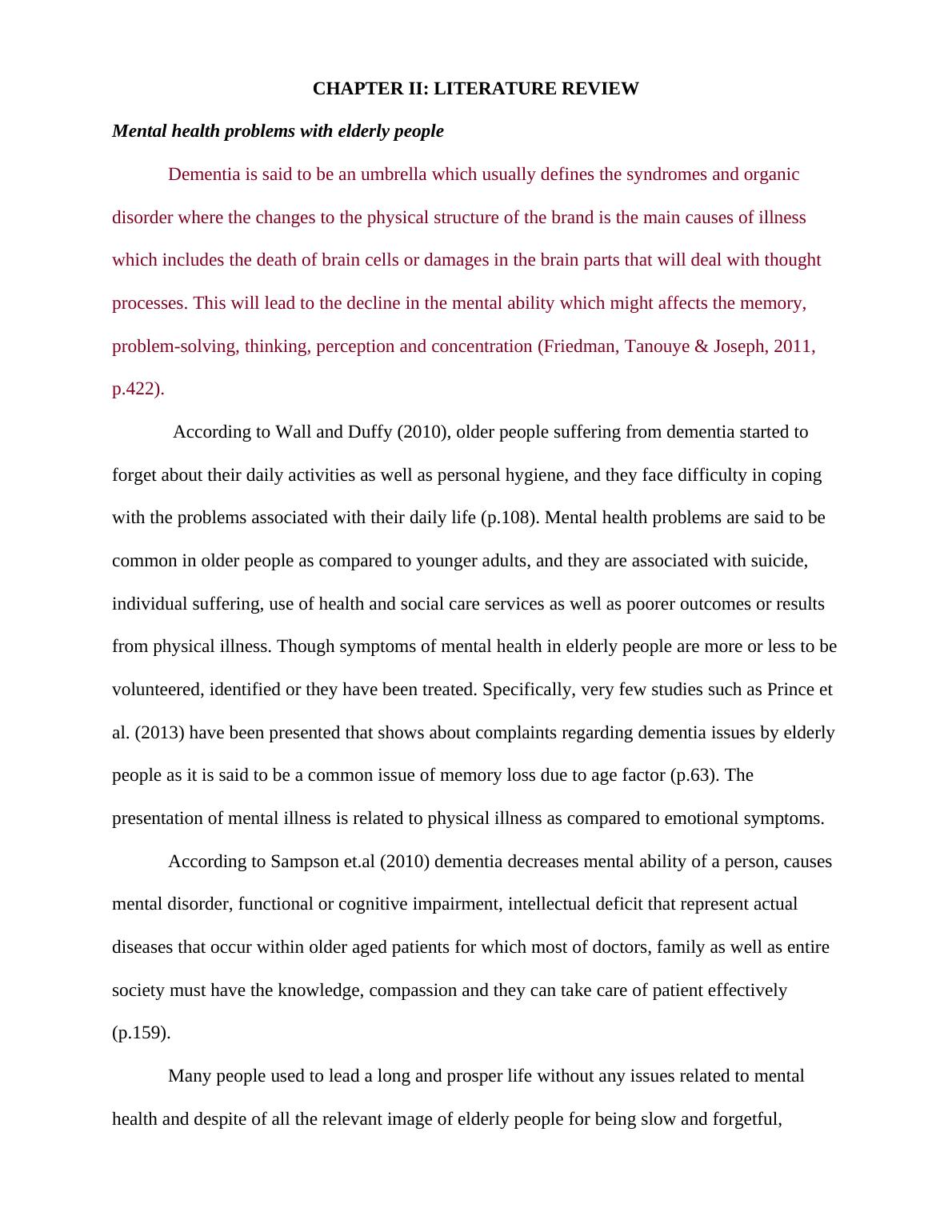
End of preview
Want to access all the pages? Upload your documents or become a member.
Related Documents
Effectiveness of Mental Health Services for Elderly with Dementialg...
|12
|2333
|98
Anxiety, Reaction Time, and the Variability of Reaction Time in Younger and Older Adultslg...
|91
|11426
|49
The impact of music therapy on wellbeing of dementia patientslg...
|12
|2931
|182
Subjective And Objective Cognitive Impairment : Literature Reviewlg...
|60
|18572
|66
Assignment on Dementia in Elderly Population in Australialg...
|13
|3013
|17
Best Practices for Imparting Holistic Care to Dementia Patientslg...
|8
|2126
|80
